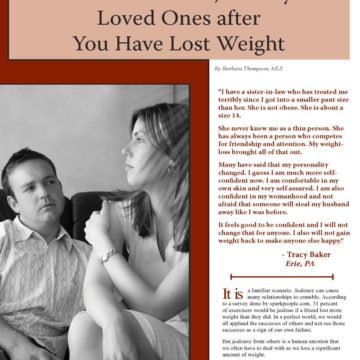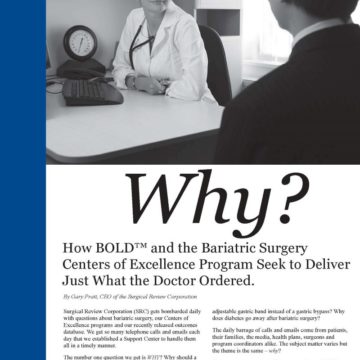I’m a Weight-loss Surgery Patient and I am Relocating. Where should I go to seek care if I need it?


By Laura M. Boyer, RN, CBN
Winter 2008
The decision to treat obesity with weight-loss surgery (WLS) includes making a lifetime commitment to follow-up care. This means the surgeon and the program team commit to providing care and guidance. You, the patient, commit to periodic appointments for evaluation and receiving that care and guidance. So what should you do when you relocate?
In the case of a well-planned move, you should start with a little research. Not all surgeons and programs accept outside patients. Your surgeon may refer you to a colleague in your new location. In this case, it should be easy to have records and important information forwarded as well as a referral letter describing your history and care.
Resources for locating bariatric surgeons and programs in the area can also be found on the Internet. The medical and professional organizations provide Web site information. I have included them at the end of this article. There are also many Web sites where WLS patients network. Ideally, before you actually make the move, you should locate a program that will “adopt” you. I recommend contacting them well in advance to ask for information.
Laparoscopic Adjustable Gastric Banding Patients
If you have an adjustable gastric band, maintaining a regular schedule for adjustments is essential to your success, especially if you are still in the process of losing excess weight. The doctor who assumes your care needs information about the type and size of the band, as well as the operative technique.
For that reason it is a good idea to have a copy of the operative report from the original surgeon. Information about your health and illnesses, test results, previous adjustments and weight-loss is very helpful to develop a plan of care that picks up where you left off. Although nutritional deficiency is uncommon in band patients, annual nutritional blood work should be a part of that plan. Anytime you have an implanted device, you should have specific information about the manufacturer, model and size.
Patients who Underwent a Malabsorptive Weight-loss Surgery Procedure
WLS patients who have had malabsorptive procedures, such as biliopancreatic diversion (BPD), duodenal switch (DS) or Roux-EN-Y gastric bypass, must obtain healthcare that includes periodic nutritional blood work. Lifetime nutritional supplements and annual blood work are essential to preventing malnutrition and potentially irreversible illnesses.
For this reason, it is important to find a physician with knowledge of your specific nutritional needs. There are a growing number of physicians who specialize in the treatment of obesity and the care of postoperative WLS patients called bariatricians. Very often they are associated with comprehensive weight-loss and surgery programs. To locate a bariatrician, please visit the American Society of Bariatric Physicians’ Web site at www.asbp.org.
Weight-loss Surgery Patients and Follow-up Care
WLS patients often need less medical attention as their obesity-related illnesses, such as diabetes and high blood pressure, improve. However, it is important to remember that you should continue to monitor these conditions and find a primary care physician for proper care and medication adjustments as needed.
WLS patients, who develop abdominal symptoms that may be surgery-related, should always consult a surgeon who specializes in bariatric surgery. These symptoms might include vomiting, acid reflux, unexplained fever, change in bowel habits, blood in stool, abdominal pain or drainage from the port incision area. Establishing a relationship for follow-up care with a comprehensive program is the best way to prevent nutritional complications and to detect surgical complications before they are serious or life-threatening.
Finding a New Support Group
An important key to your weight-loss success is emotional support. Attend a support group as soon as you can. This will provide the support you may need during a potentially stressful event, as well as a network of friends in your new location. If you have contact with the program coordinator before the move, ask if there are any supportive patients who would be willing to communicate with you by email. This will provide a link to the group before you attend the meeting.
During an Emergency
One last area to discuss would be the situation when a WLS patient travels or finds themselves suddenly relocated; such as an evacuation due to a disaster. The motto, “always be prepared,” comes to mind.
Always have your surgeon’s contact information, including Web site or email address. It is a good idea to have a copy of the operative report that contains the procedure description. You can request this from the hospital or your surgeon’s office within a month after your surgery.
If you have an adjustable gastric band, you should know the manufacturer, model and size. Make sure you have at least a two week supply of medications and vitamin/nutritional supplements that is handy and ready to travel at all times. In cases of emergency, always notify your caregivers that you are a WLS patient. It is best to consult a bariatric surgeon whenever an abdominal or pelvic condition is treated. At the very least, the doctor who is caring for you should call your surgeon for information and advice.
Questions You Should Ask
- Do you accept patients from outside programs? If so, what documents do I need to provide?
- What types of WLS procedures are done and how many have been done by your surgeon(s)?
- What resources are available, such as nutritional instruction, psychological support, support groups and exercise programs?
- What is the recommended follow-up schedule?
- Do you accept my insurance? (If you do not have insurance coverage for bariatric surgery care, ask about cost and the care that is included in that cost.)
- Are there any additional expenses or program fees involved with assuming my care?
- Do you use fluoroscopy for routine adjustments for adjustable gastric band patients? If so, is there an additional charge?
- Can you recommend a primary care physician in the area?
Recommended Resources:
- American Society for Metabolic and Bariatric Surgery – www.asmbs.org
- American Society of Bariatric Physicians – www.asbp.org
- American College of Surgeons – www.facs.org
- Surgical Review Corporation – www.surgicalreview.org
About the Author:
Laura M. Boyer, RN, CBN, has been Director of the Bariatric Surgery Program for The Surgical Specialists of Louisiana, serving the southern Louisiana area, since its inception in 2001. She has been a Registered Nurse for 25 years with experience in peri-operative and critical care.
by Robyn Pashby, PhD Winter 2024 “No one is ever going to date you if you don’t…
Read Articleby Kendall Griffey, OAC Communications Coordinator Winter 2024 The Obesity Action Coalition’s 12th annual Your Weight Matters…
Read Articleby Nina Crowley, PhD, RD (with Inspiration from Shawn Cochran) Winter 2024 Dating, no matter your age,…
Read Article









